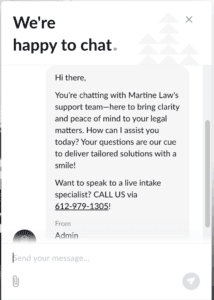In the fast-paced, competitive world of legal services, your law firm’s website isn’t just a digital brochure—it’s your first impression, your 24/7 salesperson, and your virtual office. A poorly designed website can turn away potential clients before they even learn about your services, while a great one can elevate your firm’s reputation, attract new business, and foster trust with current clients.
At Legends Legal Marketing, we understand the importance of a well-crafted website. We know that the look, feel, and responsiveness of your site play a crucial role in converting visitors into clients. By focusing on the 7 features detailed in this blog, you can transform your website from a passive presence into a powerful marketing tool that drives leads and showcases your firm’s strengths.
Whether you’re a solo practitioner or a large firm, a strong online presence is essential in today’s legal market. It’s time to invest in a website that reflects your professionalism, experience, and commitment to client service. Read on to discover the key elements of great law firm web design and learn how we can help you create a website that truly persuades visitors to reach out to your legal team.
1. A Strong Call to Action
Your call to action is your chance to convince a reader to pick up the phone and make a call, click the live chat feature, or fill out the online contact form. This is your opportunity to tout the merits of your services and communicate exactly how your legal team will help prospective clients. Invest the time necessary to compose a compelling call to action and your conversion rate will eventually spike.
Pro Tip:
- Avoid visual clutter, as it might discourage rather than encourage the reader to react. Ensure your CTA is clear yet bold.
2. Mobile Responsive Design
Your law firm website must look and function flawlessly on all mobile devices. As time progresses, more people are ditching traditional desktop computers for mobile devices such as tablets and smartphones. If your law firm website does not work properly on these mobile devices, people will venture to competitors’ websites.
Pro Mobile Usability Tips:
- For best user experience on smaller devices:
- include only the necessary fields in the forms
- ensure users can easily navigate the website/return to the homepage
- keep the buttons at least 44px apart so they can be tapped easily
- keep CTA’s at the front/center
- keep navigation short; don’t confuse users with too many options
3. Quick and Clear Ways to Contact the Firm
It should be easy for online visitors to find your firm’s contact information. Add contact information to your website footer so it’s visible on all pages/posts. Feature your firm’s phone number at the top of the homepage. Add attorney email addresses to their profile pages. Add a live chat feature along with an online contact form so those most comfortable reaching out to your law firm online can easily start a conversation by way of the web.
Pro-Tips:
- The classic-but-minimal approach is generally the way to go when you only need a name, email address, and a message from users.
- Test your contact forms to ensure they function properly.
4. Featured Client Testimonials
Word-of-mouth referrals are essential to connecting with new clients. Furthermore, presenting written or video testimonials on your website will help convince potential clients to hire your legal team. It will also help to ask satisfied clients to leave reviews of your law firm on the most popular online directories.
Pro Tip:
- Use a “Call to Action” on your Testimonial Page
- Use interesting layouts and emphasize your best testimonials to engage the user to read on, large amounts of text can overwhelm the user
5. Avoid Stock Photos
Those who use the web with regularity can easily spot a stock photo. There is no reason to rely on stock photos thanks to advances in technology. Take pictures or video of your legal team, your office exterior, and the reception space to show clients what to expect when visiting.
Pro Tips:
- Be creative and stand out. Images should tell the story of your brand/business and clearly communicate your message to the user.
6. Links
Links are essential to online success in a number of regards. For one, including links to your blog and homepage in all online content including Twitter posts, Facebook posts, and guest blog posts will direct traffic to your online hub. Secondly, internal linking throughout your site will boost your search engine optimization (SEO). It will also help to contribute to other websites, blogs, and social media to build reciprocal relationships that will eventually steer traffic toward your firm’s website.
7. A Blog
A blog can do wonders for your website, as well as your law firm. Use your blog as an opportunity to establish your legal team as true experts in the field. Blogs that prove informative, helpful, and solution-based will convince clients to trust your team. If you don’t have the time or the writing chops to regularly update your blog with informative content presented in an artful manner, outsource the work to writers.
Continue to update your blog with keywords and key phrases relevant to your legal niche and it will be that much easier for those in need of legal services to find your online footprint. Above all, the content you add to your blog should be useful. Try to improve the lives of prospective clients with each post. A steady stream of informative content will humanize your firm and develop a rapport with prospective clients.
PRO TIPS:
- Focus on Quality Content
- Make Sure Content is Relevant to your Legal Niche
- Use Audio/Visuals in your Blog. Keeps People Interested Longer
- Post Regularly. Consistency is Key
- Promote your Blog on all your Social Media Profiles
Food For Thought: your blog’s design doesn’t have to be complicated or over the top; it can be simple. The important thing to know is the blog is the #1 contributor to great SEO!











